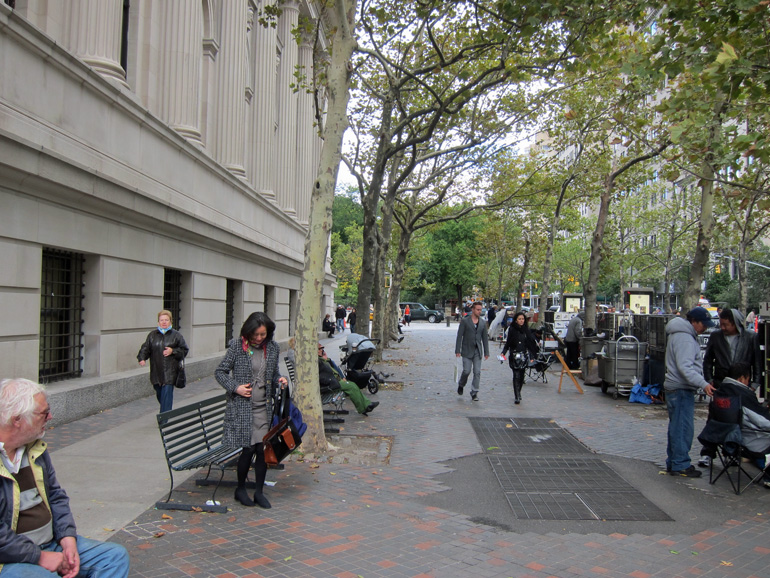Gotham Diary:
Tweaking Greek
25 October 2012
My least favorite thing about growing old is my sensitivity to the weather, which, in a climate as changeable as New York’s, can be an awful inconvenience. Glum weather makes me glum — physically. (I’m convinced that what I’m sensitive to is barometric pressure, on the molecular level.) Today is very glum. I am trying not to be.
It reminds me of something else that I was reading in the LRB, Christian Lorentzen’s review of the new David Foster Wallace biography by T J Max. It is an awful shame that Wallace, who suffered so horribly from it, never applied his genius for words to the development of a term to replace “depression” — surely a name that seems itself to suffer symptoms of the disease that it refers to. Depression is what I’m feeling on this day of “clouds and fog” (according to the Times). I feel a bit low, a bit inert. What we somewhat witlessly call “clinical depression” — And what does clinical mean, here? That the illness is “serious”? That it has been diagnosed by doctors? That it requires medication? Do we speak of “clinical cancer” or “clinical heart disease”? No. — this is not some worse version of what I’m feeling today. It’s significantly different, different enough to warrant a different, and, hopefully, a more meaningful label. Â
Wallace certainly described the illness with informing rigor — twice: first, in an uncollected story, “The Planet Trillaphon as It Stands in Relation to the Bad Thing,” and then in a passage in Infinite Jest. Here is the latter; Kate Gombert, a would-be suicide, explains why “depression” is the wrong word:
When people call it that I always get pissed off because I always think depression sounds like you just get like really sad, you get quiet and melancholy and just like sit quietly by the window sighing or just lying around. A state of not caring about anything. A kind of blue kind of peaceful state … Well this … isn’t a state. This is a feeling. I feel it all over. In my arms and legs … All over. My head, throat, butt. In my stomach. It’s all over everywhere. I don’t know what I could call it. It’s like I can’t get enough outside it to call it anything. It’s like horror more than sadness … Have you ever felt sick? I mean nauseous, like you knew you were going to throw up? … But that’s just in your stomach … It’s a horrible feeling but it’s just in your stomach … OK but imagine if you felt that way all over, inside. All through you. Like every cell and every atom or brain cell or whatever was so nauseous it wanted to throw up, but it couldn’t, and you felt that way all the time.
“I can’t get enough outside it to call it anything.” If we could somehow tweak that in Greek, we’d have half of the new name. The other half would come from the bit about every part of the body’s wanting to throw up, but being unable to.
***
Another question that comes to mind whilst thinking of DFW is whether it makes sense to speak of celebrity as a kind of power. To be fair to the writer here, I ought to speak, in an old-fashioned tone, of Fame. (There seems to be an implicit consensus that, even if you can become famous just for being famous — pardon that ontological backwardness — that kind of famousness does not involve Fame.) The fame that Wallace sought was the kind that perdures for centuries. He wanted to be famous for writing extraordinarily well. It is too early to measure his success, largely because it will depend on the influence of his work, which has yet to tell. But he seems also to have been aware that the pursuit of fame can be corrosive as well as exhausting.
The fame that Wallace achieved gave him a degree of worldly power, in the literary and academic worlds. At least I assume so. I assume that his nod was a very potent recommendation. He appears to have gone out of his way to be nice about this; indeed, he seems to have been tortured by the longing to be nice, to the point of falling into paradox: it is not Nice to pursue Fame. It is disingenuous to keep an eye on your status while you are striving to bring Light and Truth to Mankind. I can’t help thinking of this as a deeply Midwestern conundrum.
But I’ve been digressing. I don’t, in the end, regard celebrity as a kind of power, not in the way that power interests me these days. Power is more than the celebrity’s ability to allow or encourage. It is a matter of compulsion. The powerful person can make other people do things, whether they want to or not. Nothing would ever get done without power, but from the very beginnings of our intellectual history, we have been trying to figure out how to mitigate the ghastly side effects of vesting power in any given individual man or woman.
It seems useful to regard power as creating an addiction, much as an addictive drug does. This is really the only way to explain the difficulty of setting power aside after a term. It’s interesting to note how assiduously our social arrangements for retired possessors of power attempt to mask the retirement: unless a formerly-powerful person is bent on self-destruction, he or she will continue to enjoy many of the perquisites of power, by being awarded more or less authoritative positions with more or less authoritative insitutions, not to mention the rituals of respect and convenience embodied by a car and driver. The formerly-powerful person will be provided with a troupe of de facto servants willing to jump when so bid. This illusion of continued power appears to be an effective treatment of the addiction.
But the unwillingness to retire is not the worst thing about the addiction to power. The worst thing is the deformation of judgment that induces powerful people to prefer short-term tactics for preserving their power to long-term strategies for accomplishing the goals that (presumably) fueled their launch to power. Might it be possible to inoculate candidates for powerful positions against this deformation? I’m not talking about a book of wise sayings or best practices. I’m talking about a simulation, not unlike the simulation of power that I’ve just described in connection with retirement.
When she was in elementary school, Kathleen and one of her classmates vied for slaves. I don’t think that anything particularly onerous was involved, and the girls who were slaves may simply have gone along with the game so long as it was a game. The idea was not so much to have slaves as to have more slaves. But eventually Kathleen awoke to the sensation that having slaves at all is pretty crummy, and she has never tried to control anyone else’s life ever since.




















